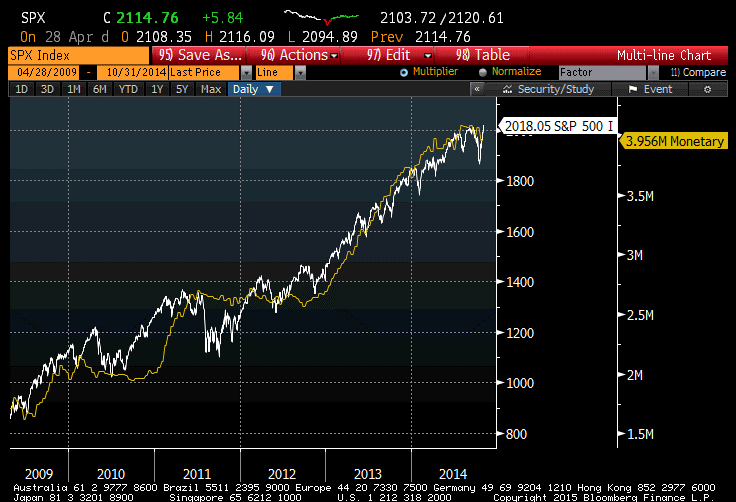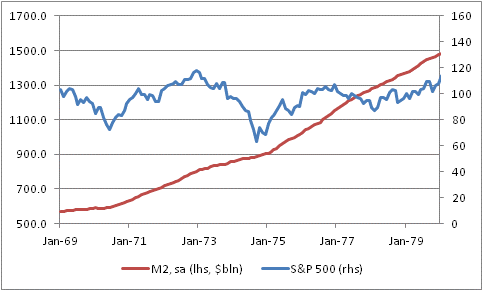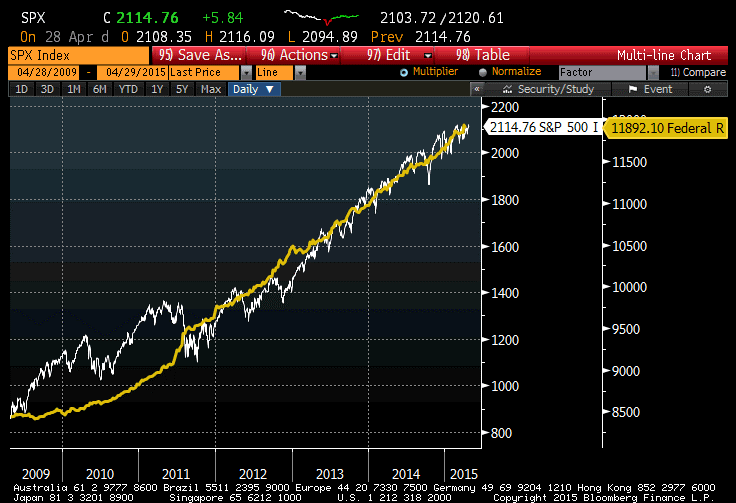I am not one of those people who believe that if the Fed is dramatically easing, you simply must own equities. I must admit, charts like the one below (source: Bloomberg), showing the S&P 500 versus the monetary base, seem awfully persuasive.
But there are plenty of counter-examples. The easiest one is the 1970s, shown below (source: FRED, Bloomberg). Not only did stocks not rise on the geyser of liquidity – M2 growth averaged 9.6% per annum for the entire decade – but the real value of stocks was utterly crushed as the nominal price barely moved and inflation eroded the value of the currency.
If you do believe that the Fed’s loose reins are the main reason for equities’ great run over the last few years, then you might be concerned that the end of the Fed’s QE could spell trouble for stocks. For the monetary base is flattening out, as it has each of the prior times QE has been stopped (or, as it turns out, paused).
But for you bulls, I have happy news. The monetary base is not the right metric to be watching in this case. Indeed, it isn’t the right metric to be watching in virtually any case. The Fed’s balance sheet and the monetary base both consist significantly of sterile reserves. These reserves affect nothing, except (perhaps) the future money supply. But they affect nothing currently. The vast majority of this monetary base is as inert as if it was actually money sitting in an unopened crate in a bank vault.
What does matter liquidity-wise is transactional balances, such as M2. And as I have long pointed out, the end of QE does nothing to slow the growth of M2. There are plenty of reserves to support continued rapid growth of M2, which is still growing at 6% – roughly where it has been for the last 2.5 years. And those haven’t been a particularly bad couple of years for stocks.
So, if liquidity is the only story that matters, then the picture below of M2 versus stocks (source: Bloomberg) is more soothing to bulls.
Again, I think this is too simplistic. If ample liquidity is good today, why wasn’t it good back in the 1970s? You will say “it isn’t that simple.” And that’s exactly my point. It can’t be as easy as buying stocks because the Fed is adding liquidity. I believe one big difference is the presence of financial media transmitted to the mass affluent, and the fact that there is tremendous confidence in the Fed to arrest downward momentum in securities markets.
What central bankers have done to the general economy has not been successful. But, if you are one of the mass affluent, you may have a view of monetary policy as nearly omnipotent in terms of its effect on securities and on certain real assets such as residential real estate. What is different this time? The cult.
I am no equity bull. But if you are, because of the following wind the Fed has been providing, then the good news is: nothing important has changed.



